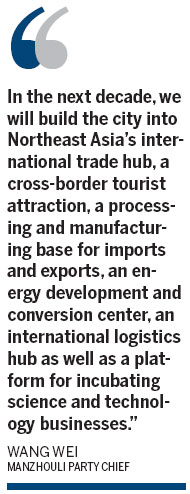China builds on border trade
Updated: 2013-03-04 07:50
By Li Jiabao in Beijing and Wang Kaihao in Manzhouli, Inner Monglia (China Daily)
|
||||||||
Accession to WTO
Russia was accepted as the 156th member of the WTO on Aug 22, 2012, with a process of accession of more than 19 years.
At the end of the implementation period, the average tariff ceiling for Russian imported products will be lowered to 7.8 percent from the average 10 percent that was applied before accession. The average tariff ceiling for manufactured products will be 7.3 percent instead of 9.5 percent while the average tariff ceiling for agricultural goods will be 10.8 percent instead of the earlier average of 13.2 percent.
In addition, Russia has offered improved market access opportunities in certain areas of goods and in many service sectors, according to the WTO.
"After accession to the WTO, Russia started to scrap differentiated taxes in transportation, which discriminated against foreign goods, and enhanced transparency through removing the price determining mechanism of imported goods. It's very meaningful for high quality Chinese products with competitive prices to enter Russia," Wang Junwen, president of China Association of International Trade, said during a forum on Jan 17 in Boao, Hainan province.
"The mentality and attitudes of Russian businessmen are changing after the accession to the WTO and trade areas are expanding. Chinese exports, occupying the middle- and low-end of Russia markets with price advantages will expand. We also see an enlarging import inventory and the prospect is bright for trade in gas, grain and minerals," Zou Jifeng, deputy mayor of Manzhouli, told China Daily.
Wang from the association pointed to promising China-Russia cooperation in high-tech sectors as Russia undergoes re-industrialization based on high technology and supported by rich resources and talent.
More than 70 percent of China's exports to Russia are now machinery and equipment products, the majority of which are complete sets of equipment products. The share is still expanding in view of Russia's robust demand for equipment in reforming industries and building up infrastructure such as power stations, according to Wang.
"It proves that accession to the WTO brings new opportunities for a country's economic development. Russia and China are highly complementary industrially. Russia did not set obstacles for Chinese industries and capital to enter Russia," said Oleg Soskovets, former first deputy prime minister of Russia, during the Boao forum.
The World Bank estimated that Russia's accession to the WTO will drive the nation's economy to grow by 3 percent while the US expects its exports to Russia will double in five years.
New boom
"Manzhouli is welcoming its second boom now as a leading player in China-Russia border trade," Gao Jian, chairman of China Development Bank Securities Co, told an investment promotion on Jan 16 in Beijing.
In July 2012, the State Council approved the establishment of a key development and opening-up experimental zone in Manzhouli. It also approved similar zones in Ruili, Yunnan province and Dongxing in Guangxi Zhuang autonomous region at the same time. Echoing the State Council's move, Inner Mongolia autonomous region also issued 38 favorable guidelines on Jan 9, regarding fiscal and taxation measures, port and passageway construction support and preferential policies in financing, industrial development, land use, public services and talent training.
Manzhouli experienced its first boom in 1992 when the State Council listed it among the first group of frontier cities for opening-up. A 70 sq km border economic cooperation zone was established in the city's northeast area in March 1992 that has now developed into the city's downtown area. A China-Russia mutual trade zone was also built in 1992 covering 0.2 sq km. It expanded to 138.8 sq km in 2004.
The past decade saw a boom in wood processing, fruit and vegetable storage and transportation, chemical construction materials and mechanical assembly as well as border tourism in Manzhouli. The city's foreign trade surged 73.37 percent annually from 1992 to 2011.
"In the next decade we will build the city into Northeast Asia's international trade hub, a cross-border tourist attraction, a processing and manufacturing base for imports and exports, an energy development and conversion center, an international logistics hub as well as a platform for incubating science and technology businesses," said the city's Party Chief Wang Wei.
"Although the 2008 global financial crisis constrained border trade value from expanding significantly, cargoes transported via the port have been steadily increasing," said Zou, deputy mayor of Manzhouli.
"Russia imports light industrial products, textile products, electronics as well as fruits from its biggest neighboring nation, while China imports resources such as oil and coal. Trade opportunities will surely increase amid strengthening political ties. The prospects are very bright," he said.

 Li Na on Time cover, makes influential 100 list
Li Na on Time cover, makes influential 100 list
 FBI releases photos of 2 Boston bombings suspects
FBI releases photos of 2 Boston bombings suspects
 World's wackiest hairstyles
World's wackiest hairstyles
 Sandstorms strike Northwest China
Sandstorms strike Northwest China
 Never-seen photos of Madonna on display
Never-seen photos of Madonna on display
 H7N9 outbreak linked to waterfowl migration
H7N9 outbreak linked to waterfowl migration
 Dozens feared dead in Texas plant blast
Dozens feared dead in Texas plant blast
 Venezuelan court rules out manual votes counting
Venezuelan court rules out manual votes counting
Most Viewed
Editor's Picks

|

|

|

|

|

|
Today's Top News
Boston bombing suspect reported cornered on boat
7.0-magnitude quake hits Sichuan
Cross-talk artist helps to spread the word
'Green' awareness levels drop in Beijing
Palace Museum spruces up
First couple on Time's list of most influential
H7N9 flu transmission studied
Trading channels 'need to broaden'
US Weekly

|

|








